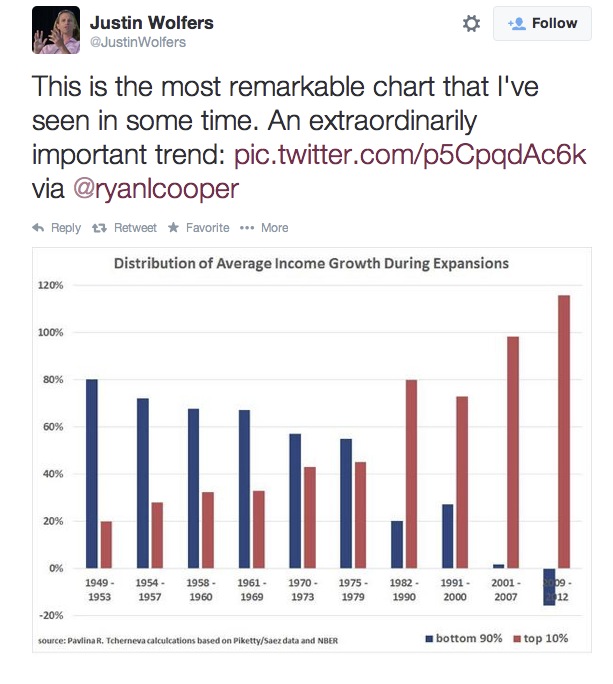
Wray argues that monetary and fiscal policy used during the recessions was geared to helping the wealthy at the expense of everyone else. He writes:
In the latest calamity, we had tens of trillions of dollars of
attention paid to rescuing our top tenth of a percent on Wall Street,
and mere peanuts thrown at Main Street. In other work, Pavlina has
documented that the “fiscal stimulus” was not aimed at those who
suffered the most; and students of mine, namely Andy Felkerson and
Nicola Mathews showed that Uncle Ben originated well over $29 trillion
in low interest rate loans to rescue Wall Street. (Go here for papers on
this project: http://www.levyinstitute.org/ford-levy/governance/) No wonder that when the economy began to recover, our One Percenters
captured more than all the gains. They are rich and powerful, and Uncle
Sam directed almost all his efforts to them.
As Hyman Minsky argued back in the 1960s, if you want to reduce
poverty you must include job creation as a central component of your War
on Poverty. He (correctly) predicted that the Kennedy-Johnson War on
Poverty would fail because it did not contain such a program.
Further, he argued that once you’ve provided jobs to all who want to
work, you need to gradually shift the distribution of income toward the
bottom. You do that by holding down income growth at the top while
gradually increasing pay at the bottom.
Randy Wray: Rising Tides Lift All Yachts – Why the 1% Grabs all the Gains From Growth | naked capitalism
Since income distribution in the U.S. is more concentrated at the top than ever, Wray provides a convincing argument. I do believe that a large scale collapse of the firms receiving bailout loans would've done more harm to the economy than the bailout loans, however, the loans certainly benefited corporations and wealthy individuals more than the middle class. The concept of heavily taxing wealthy individuals doesn't bode well with me, however, massive tax breaks on wealthy individuals also doesn't seem "fair." Although it is imperative that the income gap shrinks. History has shown us that when societies experience a high concentration of wealth, more problems than benefits tend to arise.
ReplyDeleteI agree with Minsky's proposal for an alternative way to eliminate poverty is to achieve and sustain “tight full employment,” when "industries, employers, at going wages and salaries, would prefer to employ more workers than they in fact do." I also find some similarities between Minsky' proposal with Paul Krugman's perspective that government needs to spend more. Corporations are willing to employ more workers than they in fact do only when the government are ready to spend to recover the economy. I think it will be a while before government is willing to spend more and the median can capture a larger share of the subsequent growth.
ReplyDelete